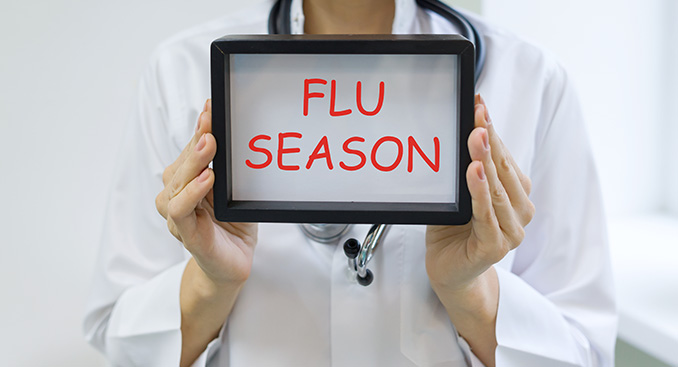- Conditions & Care
- Disease & Symptom Information
- General
- Health & Wellness
- Infectious Disease
- Primary Care
- Treatments
What's Your Flu IQ?

Take our quiz and see how prepared you really are for this year’s flu season.
Maybe the flu won’t strike you this year, with its fever, dry cough, sore throat, body aches and chills. But why take your chances? The Centers for Disease Control and Prevention (CDC) estimates that tens of thousands of people die from the flu and flu-related complications each year. Prevention is key. Take our quiz, which is based on the latest CDC information, and learn what to do to avoid the flu. (answers below)
1. Which of these symptoms is more specific to the flu than to a common cold?
- Cough
- Body ache
- Congestion
- Sneezing
- None of the above
2. Which of these are good steps to take to avoid getting the flu?
- Avoid infected individuals
- Get a flu vaccine
- Drink lots of fluids and maintain a balanced diet
- Wash your hands often
- All of the above
3. When you’re exposed to the flu, how long does it typically take for you to become ill?
- One to four days
- One week to 10 days
- An hour or two
- A month
- Instantly
4. Who is not among those at highest risk for developing serious complications from the flu?
- Pregnant women
- People 65 years of age and older
- People who work more than 40 hours per week
- People with chronic illnesses like asthma and diabetes
- Young children
5. Which of these are recommended to help avoid the spread of the flu?
- Cough or sneeze into the crook of your arm
- Wash hands frequently with warm water and soap
- Stay away from work if you have symptoms
- Avoid touching your eyes, mouth and nose
- All of the above
6. Which of these is true about the flu?
- It is caused by being cold and wet
- It always comes with a fever
- It is caused by a virus
- It cannot be diagnosed through tests
- You can catch the flu from the vaccine
7. What is the No. 1 step recommended by the CDC to avoid getting the flu?
- A fl u vaccine at the start of flu season (usually October/November)
- Plenty of vegetables and fruits
- At least eight hours of sleep/night
- Staying away from populated areas
- Daily doses of aspirin
Answers: 1. b; 2. e; 3. a; 4. c; 5. e; 6. c; 7. a
Your Flu IQ:
How many did you get right, and where do you rank? No matter your score, use the insights gained to reduce your future risk.
6-7: You're flu-prevention smart
4-5: Your flu facts need a booster shot
2-3:The flu may likely be in your future
1-2:You have no clue about the flu
Where to Get Your Flu Shot
To get your flu shot or if you are in need of care because you are experiencing flu-like symptoms, call your doctor or check in online to reserve your spot at a TriHealth Priority Care location.
Related Articles
- Conditions & Care
- Infectious Disease
- Service Line
- Treatments